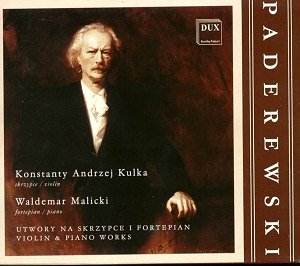Dux has brought out,
not inappropriately for a Polish label,
a slew of Paderewski’s compositions.
The centrepiece of this one is the big
A minor Violin Sonata and it is a wake
up call to those who only know his piano
miniatures – not least the once ubiquitous
and oft-transcribed Minuet in G major
– or have yet to catch up with his large-scale
works. It was written in 1880 when he
was twenty-five – that’s to say after
some strenuous studies in Vienna with
Leschetizky and just before the vortex
of his first early successes as a pianist
which began in Paris and Prague in 1883
and soon swept across Europe and America.
It was Brahms who said of the work that
it was less a Violin Sonata and more
a Concert Sonata and one sees what he
means. It’s an impressive though not
entirely distinctive concertante work,
bold, flourishing, Romantic, employing
folk material and plenty of idiomatic
drama. The piano part, as one would
expect of Paderewski, is highly virtuosic
and busy – ideally he should have pared
away a deal of the piano’s quasi-independence
because it can be thematically counter
productive and in this performance the
ear is often drawn to the accompanying
harmonic melodrama rather than the lyrical
violin part (no fault of the performers).
Which I suppose was Brahms’ point. Nevertheless
there is nobility in the long opening
movement and great breadth and strong
Romantic Brahmsian rhetoric – and a
lyric elasticity of phrasing that Paderewski
drew upon in vocal, sonata and solo
works all his compositional life. The
tempestuous zigeuner element is not
stinted and nor is expressive affection
in the Andantino whereas in the finale
there’s vigour and excitement (if to
be honest some rather prosaic passagework
from time to time).
The Allegro de Concert
is a partial reconstruction. It is undated
and was left incomplete at his death
and so Arnold Rezler has stitched the
extant passages together. It makes for
a fine, big boned sonata form study.
There’s some attractive lyricism amidst
the Vieuxtemps type bombast. The Melody
Op. 16 No. 2 was transposed for violin
and piano by the distinguished Polish
fiddle player Stanisław
Barcewicz. It’s a melodic delight and
a real charmer and the transposition
from the piano original works well.
It’s not the first
time I’ve heard Kulka and he impresses
me again. He has the sensitivity to
shape and mould the Sonata’s second
movement with discreet expressive shadings
and he drives powerfully in the final
movement. He can relax in salon style
as well, as he shows with the Melody
(though there are a couple of intonational
slips I think in the Allegro de Concert).
Malicki clearly enjoys the big challenges
of the Sonata and demonstrates real
command – their ensemble is fine.
The acoustic is sympathetic
and the notes in Polish and English.
The Sonata has been issued on Pavane
in recent time but there’s it’s coupled
with non-Paderewski items. Granted this
disc is short measure but inquisitive
minds may still want to get to grips
with this little-known corner of the
Brahmsian sphere of influence in pan-European
sonata writing.
Jonathan Woolf
